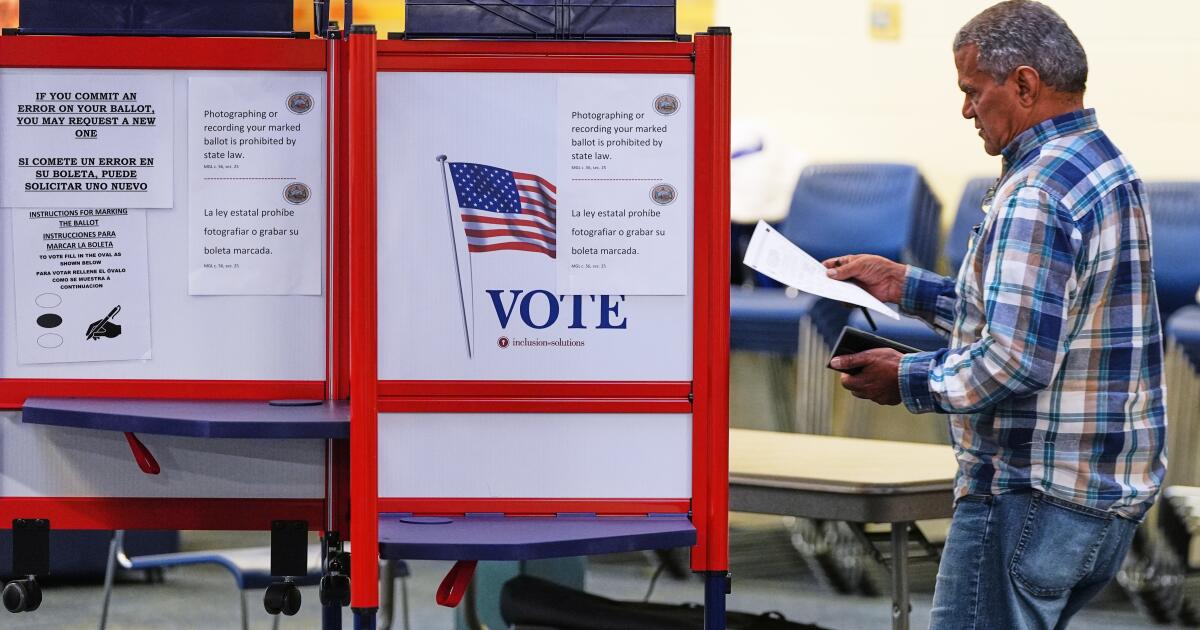Justice Department sues four more states for access to detailed voter data
The U.S. Justice Department is suing four more states as part of its effort to collect detailed voting data and other election information across the country.
The department filed federal lawsuits against Colorado, Hawaii, Massachusetts and Nevada on Thursday, accusing them of “failing to produce statewide voter registration lists upon request.” So far, 18 states have been sued, including California, along with Fulton County in Georgia, which was sued over records related to the 2020 election, which President Trump continues to falsely claim he won.
The Trump administration has characterized the lawsuits as part of an effort to ensure the security of elections, and the Justice Department says the states are violating federal law by refusing to provide the voter lists and information about ineligible voters.
The lawsuits have raised concerns among some Democratic officials and voting rights advocates who question exactly how the data will be used, and whether the department will follow privacy laws to protect the information. Some of the data sought include names, dates of birth, residential addresses, driver’s license numbers and partial Social Security numbers.
“States have the statutory duty to preserve and protect their constituents from vote dilution,” Assistant Atty. Gen. Harmeet K. Dhillon of the Justice Department’s Civil Rights Division said in a press release. “At this Department of Justice, we will not permit states to jeopardize the integrity and effectiveness of elections by refusing to abide by our federal elections laws. If states will not fulfill their duty to protect the integrity of the ballot, we will.”
Colorado Secretary of State Jena Griswold, a Democrat, said her office declined to provide unredacted voter data.
“We will not hand over Coloradans’ sensitive voting information to Donald Trump. He does not have a legal right to the information,” Griswold said Thursday after the lawsuit was filed. “I will continue to protect our elections and democracy, and look forward to winning this case.”
Nevada Secretary of State Francisco Aguilar, also a Democrat, said the Justice Department hasn’t provided clear answers about how the data will be used, and he has a duty to follow state law and protect voters’ sensitive information and access to the ballot.
“While these requests may seem like normal oversight, the federal government is using its power to try to intimidate states and influence how states administer elections ahead of the 2026 cycle,” Aguilar said in a news release. “The Constitution makes it clear: elections are run by the states.”
In a Sept. 22 letter to the Justice Department, Hawaii Deputy Solicitor Gen. Thomas Hughes said state law requires that all personal information required on a voter registration district other than a voter’s full name, voting district or precinct and voter status must be kept confidential. Hughes also said the federal law cited by the Justice Department doesn’t require states to turn over electronic registration lists, nor does it require states to turn over “uniquely or highly sensitive personal information” about voters.
An Associated Press tally found that the Justice Department has asked at least 26 states for voter registration rolls in recent months, and in many cases asked states for information on how they maintain their voter rolls. In addition to California, other states being sued by the Justice Department include Michigan, Minnesota, New York, New Hampshire, Pennsylvania, Delaware, Maryland, New Mexico, Rhode Island, Vermont and Washington. Nearly all the states are Democrat-led, and several are crucial swing states.
The bipartisan Wisconsin Elections Commission voted 5 to 1 on Thursday against turning over unredacted voter information to the Trump administration. The lone dissenter was Republican commissioner Robert Spindell, who warned that rejecting the request would invite a lawsuit. But other commissioners said it would be illegal under Wisconsin law to provide the voter roll information, which includes the full names, dates of birth, residential addresses and driver’s license numbers of voters.
Boone writes for the Associated Press. AP writer Scott Bauer in Madison, Wis., contributed to this report.
